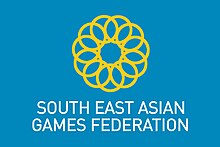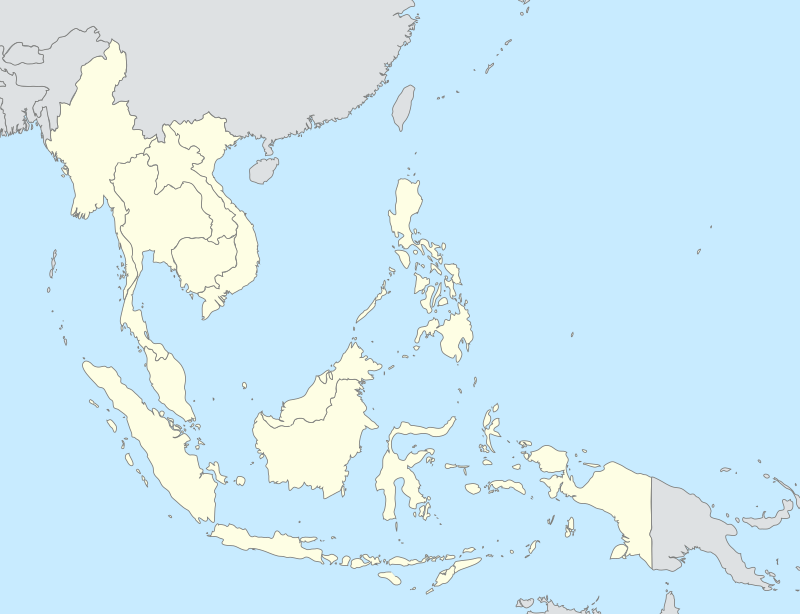
The 1959 Southeast Asian Peninsular Games, officially known as the 1st Southeast Asian Peninsular Games, was the first and inaugural edition of the biennial multi-sport event for Southeast Asian athletes, organised by the SEAP Games Federation. It was held in Bangkok, Thailand from 12 to 17 December 1959 with 12 sports featured in the games. Cambodia, one of the six founding members of the SEAP Games Federation, did not compete at the inaugural edition. For the first time and first among all Southeast Asian nations, Thailand hosted the Southeast Asian Peninsular Games, which later known as the Southeast Asian Games. The games was opened and closed by Bhumibol Adulyadej, the King of Thailand at the Suphachalasai Stadium. The final medal tally was led by host Thailand, followed by its neighbouring countries, Burma and Malaya.

The 1961 Southeast Asian Peninsular Games, officially known as the 2nd Southeast Asian Peninsular Games, was a Southeast Asian multi-sport event held in Rangoon, Burma from 11 to 16 December 1961 with 13 sports featured in the games. This was the first time all six founding members of the SEAP Games Federation competed in the biennial sports festival and the first time Myanmar, then known as Burma hosted the games. Burma, later known as Myanmar is the second country to host the Southeast Asian Peninsular Games, which later known as the Southeast Asian Games after Thailand. The games was opened and closed by Win Maung, the President of Burma at the Bogyoke Aung San Stadium. The final medal tally was led by host Burma, followed by Thailand and Malaya.

The 1965 Southeast Asian Peninsular Games, officially known as the 3rd Southeast Asian Peninsular Games, was a Southeast Asian multi-sport event held in Kuala Lumpur, Malaysia, from 14 to 21 December 1965 with 14 sports featured in the games. Originally to be hosted by Laos, the third edition of the games was hosted by Malaysia after the former was not able to honour its hosting commitment citing financial difficulties and would later known to have hosted the 2009 Southeast Asian Games decades later. Two years earlier, the third SEAP Games was cancelled as Cambodia pulled out of hosting the event due to internal strife. This was the first time Malaysia host the games. Malaysia is the third country to host the Southeast Asian Peninsular Games, which later known as the Southeast Asian Games after Thailand and Myanmar, then Burma. The games was opened and closed by Ismail Nasiruddin, the King of Malaysia at the Stadium Merdeka. The final medal tally was led by Thailand followed by host Malaysia and Singapore.

The 1967 Southeast Asian Peninsular Games, officially known as the 4th Southeast Asian Peninsular Games, was a Southeast Asian multi-sport event held in Bangkok, Thailand from 9 to 16 December 1967 with 16 sports featured in the games. Cambodia once again declined to host this edition of the games, as it did in 1963. This was Thailand's second time hosting the Southeast Asian Games, and its first time since the 1959 inaugural games. The games was opened and closed by Bhumibol Adulyadej, the King of Thailand at the Suphachalasai Stadium. The final medal tally was led by host Thailand, followed by Singapore and Malaysia.

The 1969 Southeast Asian Peninsular Games, officially known as the 5th Southeast Asian Peninsular Games, was a Southeast Asian multi-sport event held in Rangoon, Burma from 6 to 13 December 1969 with 15 sports featured in the games. Republic of Vietnam had reluctantly declined to host this edition because the attack of the North Vietnam in 1968. Singapore, the youngest member of the SEAP Games Federation at the time, suggested in this edition of the games to change the name of the sports festival to the Southeast Asia Games. Although it was not officially stated, the inclusion of the Philippines and Indonesia in the expanded federation was to greatly help alleviate the hosting problems, as well as to set higher and more competitive standards in the games. After hosting the 5th edition, Burma declined hosting succeeding games due to lack of financial capability. This was Burma's second time to host the games and its first time since 1961. The games was opened and closed by Ne Win, the Prime Minister and Chairman of Union Revolutionary Council of Burma at the Bogyoke Aung San Stadium. The final medal tally was led by host Burma, followed by Thailand and Singapore.
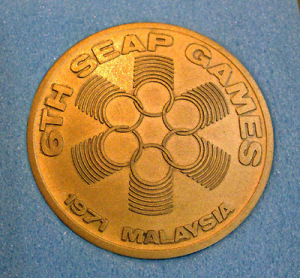
The 1971 Southeast Asian Peninsular Games, officially known as the 6th Southeast Asian Peninsular Games, was a Southeast Asian multi-sport event held in Kuala Lumpur, Malaysia from 6 to 13 December 1971 with 15 sports featured in the games. In this edition of the games, host country Malaysia joined Singapore in pressuring Thailand to let the SEAP Games Federation expand to include the Philippines and Indonesia, but to no avail. Thai officials felt that such expansion would be contrary to the small family affair they had intended the games to be, and would not be in keeping with the close-neighbours spirit the games was supposed to cultivate. This was the second time Malaysia hosted the games and its first time since 1965. The games was opened and closed by Abdul Halim, the King of Malaysia at the Stadium Merdeka. The final medal tally was led by Thailand, followed by host Malaysia and Singapore.

The 1973 Southeast Asian Peninsular Games, officially known as the 7th Southeast Asian Peninsular Games, was a Southeast Asian multi-sport event held in Singapore from 1 to 8 September 1973 with 16 sports featured in the games. This was the first time Singapore hosted the games. Singapore is the fourth nation to host the Southeast Asian Games after Thailand, Burma and Malaysia. The games was opened and closed by Benjamin Sheares, the President of Singapore at the Singapore National Stadium. The final medal tally was led by Thailand, followed by host Singapore and Malaysia.

The 1985 Southeast Asian Games, officially known as the 13th Southeast Asian Games, was a Southeast Asian multi-sport event held in Bangkok, Thailand from 8 to 17 December 1985.

The 1989 Southeast Asian Games, officially known as the 15th Southeast Asian Games, was a multi-sport event held in Kuala Lumpur, Malaysia from 20 to 31 August 1989 with 25 sports featured in the games. It was officially opened by 9th Yang di-Pertuan Agong, Sultan Azlan Shah. Although Cambodia did not participate, Laos returned to compete for the first time under the new federation name in this edition of the games, while Vietnam fields their own delegation to the event for the first time as a unified country.

The 1991 Southeast Asian Games, officially known as the 16th Southeast Asian Games, was a multi-sport event held in Manila, the Philippines from 24 November to 3 December 1991, with 28 sports featured in the games. This was the second time that the country hosted the games and its first since 1981. It was officially opened by President Corazon Aquino at the Rizal Memorial Stadium in Manila through a colorful opening ceremony. It was the only SEA Games at that time where the overall championship was heavily contested. The deciding medal came from the last sporting event - women's marathon where Indonesia got the gold medal.

The 1993 Southeast Asian Games, officially known as the 17th Southeast Asian Games were held in Singapore from 12 to 19 June 1993 with 29 sports in 440 events featured in this edition. This was the third time Singapore hosted the games after 1983 and 1973 competition. It was opened by President Wee Kim Wee. The Games featured 29 sports in 440 events. The final medal tally was led by Indonesia.
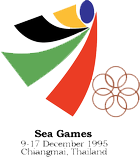
The 1995 Southeast Asian Games, officially known as the 18th Southeast Asian Games, was a Southeast Asian multi-sport event held in Chiang Mai, Thailand from 9 to 17 December 1995. It was the first time that a non-capital city hosted the biennial sports event. Chiang Mai is the second Thai city to host the Southeast Asian Games after Bangkok. The games were opened and closed by Vajiralongkorn, the then-Crown Prince of Thailand. With the return of Cambodia, all ten members of the federation were present to compete in the SEA Games for the first time.
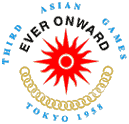
The 1958 Asian Games, officially the Third Asian Games and commonly known as Tokyo 1958, was a multi-sport event held in Tokyo, Japan, from 24 May to 1 June 1958. It was governed by the Asian Games Federation. A total of 1,820 athletes representing 20 Asian National Olympic Committees (NOCs) participated in the Games. The program featured competitions in 13 different sports encompassing 97 events, including four non-Olympic sports, judo, table tennis, tennis and volleyball. Four of these competition sports – field hockey, table tennis, tennis and volleyball – were introduced for the first time in the Asian Games.

The 2009 Southeast Asian Games, officially known as the 25th Southeast Asian Games, was a Southeast Asian multi-sport event hosted by Vientiane, Laos. This was the first time Laos had held the Southeast Asian Games as Laos had previously declined hosting the 1965 Southeast Asian Peninsular Games, citing financial difficulties. This was also the first time the Southeast Asian Games was held in a landlocked country.

The 2013 Southeast Asian Games, officially known as the 27th Southeast Asian Games, or the 27th SEA Games, and commonly known as Naypyitaw 2013, was a Southeast Asian multi-sport event took place in Nay Pyi Taw, Myanmar from 11 to 22 December 2013, Around 4730 athletes from 11 participating nations competed at the games, which featured 460 events in 34 sports. The games were held from 11 to 22 December 2013.

The 2017 Southeast Asian Games, officially known as the 29th Southeast Asian Games, or the 29th SEA Games, and commonly known as Kuala Lumpur 2017, was a Southeast Asian multi-sport event that took place from 19 to 30 August 2017 in Kuala Lumpur, Malaysia. This was the sixth time that Malaysia hosted the games and its first time since 2001. Previously, it had also hosted the 1965, 1971, 1977 and 1989 editions of the games. The 2017 edition is most notable for being the first edition to include winter sports.
The 2025 Southeast Asian Games, officially the 33rd Southeast Asian Games, or the 2025 SEA Games and also known as Bangkok–Chonburi–Songkhla 2025, is an upcoming international multi-sport event sanctioned by the Southeast Asian Games Federation (SEAGF), scheduled to be held from 9 to 20 December 2025 in Thailand with Bangkok Metropolitan Region, Chonburi, and Songkhla as their main host cities and other cities for the football tournament. The joint bid from the three cities was awarded the Games on 13 January 2023, after Thailand was confirmed as the host country by the Southeast Asian Games Federation (SEAGF). It was the first time that the host cities were selected to host the Southeast Asian Games through the bidding and election process.
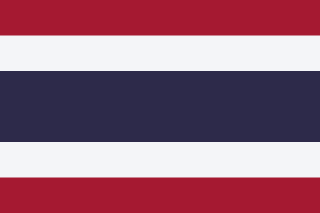
Thailand started sending athletes to the Southeast Asian Games in 1959 as a Founding member of the Southeast Asian Games Federation (SEAGF) alongside Burma, Kampuchea, Laos, Malaya, and the Republic of Vietnam. Thailand first competed in the Southeast Asian Peninsular Games (SEAPG) from its namesake of "Peninsular" meaning the Peninsular nations of Southeast Asia would be competing in the said games. There were 8 events held as a Southeast Asian Peninsular Games, 3 of which were held in Thailand. The 1963 edition of the games that would have been hosted by Cambodia was cancelled due to domestic political situation within the nation.

Malaysia started sending athletes to the Southeast Asian Games in 1959 as a Founding member of the Southeast Asian Games Federation (SEAGF) alongside Burma, Kampuchea, Laos, Thailand, and the Republic of Vietnam. Later, Malaysia tendered a suggestion to expand the Southeast Asian Peninsula (SEAP) Games Federation by inviting other Southeast Asian countries such as Brunei, Indonesia, and the Philippines. These three new members were officially welcomed into the Federation on 5 February 1977. The 1977 Southeast Asian Games in Kuala Lumpur becomes the first games that bear the title Southeast Asian Games.

Singapore has sent thousands of athletes to the celebration of the Southeast Asian Games over the decades, starting with the first edition in 1959 as a founding member. Since then, the country has sent athletes to every Southeast Games. The Singapore National Olympic Council (SNOC) is the National Olympic Committee (NOC) for the Singapore, which also oversees athletes going for the competition.

